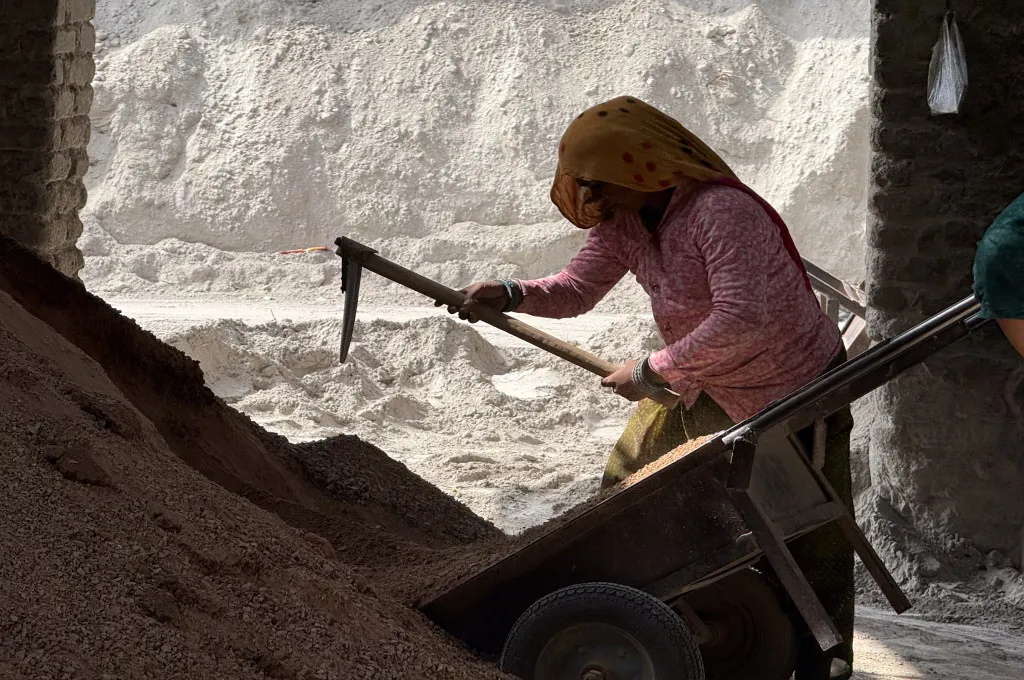The Ghazipur landfill in Delhi is one of the country’s oldest landfills, notorious for its stench and a tendency to spontaneously catch fire. Commissioned in 1984, today the landfill stands tall at 213 ft, impossible to miss as one drives down the Delhi–Meerut Expressway, and posing a hazard to informal settlements around the landfill as well as to the larger population of Delhi-NCR. The Ghazipur landfill, however, is only the tip of India’s waste mountain.
Of the 1,33,760 tonnes of municipal solid waste (MSW) generated per day in India, only a little more than half (91,152 tonnes) is collected, and less than a quarter (approximately 25,884 tonnes) is treated every day. It’s no secret that India’s urban waste system is propped up not so much by urban local bodies (ULBs) but by millions of informal waste collectors and raddiwalas (scrap dealers) operating on negligible profits. However, this is a tenuous and unsustainable system that has helped but hasn’t quite managed to solve our waste problem, and is unlikely to measure up to its growing scale. Households, itinerant waste merchants, and garbage collectors jointly recover approximately 30–60 percent of all paper and cardboard, 50–80 percent of all plastic, and close to 100 percent of all glass bottles. And yet, this only constitutes approximately 20 percent of all waste generated.
In 2024, as the country celebrates 10 years of the Swachh Bharat Mission—a nationwide initiative and one of the world’s largest cleanliness and sanitation drives—these statistics indicate the need for critical reflection on the progress made by the government, and the potential for more private-sector collaborations in the future of waste management.
Public waste, private solutions
In India, solid waste management (SWM) guidelines are set down and monitored by the Central Pollution Control Board (CPCB), a statutory body under the Union Ministry of Environment, Forest and Climate Change (MoEFCC). Given the state’s limited capacity to fulfil a dual role as both regulator and provider of waste management services, public–private partnerships (PPPs) have become common. Municipalities across India have established more than 123 PPPs by tying up with private entities to outsource collection, segregation, and processing services.
And yet, privatisation in SWM leaves much to be desired. Municipal authorities in Chennai and Hyderabad have handed over multiple zones to private players such as Ramky Enviro and Urbaser Sumeet. However, such transfers of operations have led to numerous allegations of inflated data, impossible daily targets for waste pickers, and cronyism that excludes local contractors and aggregators. A 2016 study points out that although privatisation may have improved SWM in terms of operational and economic benchmarks, social, institutional, and environmental perspectives are rarely taken into account. The study also reveals that in some cases, privatisation has not only eliminated the role of informal waste pickers but also reduced overall levels of recycling. This is because private contractors are driven by the incentive of payments based on the weight of the waste delivered at dumping sites. They are thus disincentivised from segregating waste, which would reduce tonnage.
The drawbacks of privatisation are undeniable. Yet, the potential for the private sector to implement and monitor SWM effectively on the ground remains vast and unexplored, particularly when led by entrepreneurs whose business models include local waste pickers and are driven by R&D and innovative technology.
Unpacking waste entrepreneurship
In the past decade, several start-ups have entered the SWM sector, with a modus operandi distinct from both large corporates and municipal authorities mired in bureaucracy. As of April 2023, 1,411 waste management start-ups have been recognised by the Department for Promotion of Industry and Internal Trade (DPIIT), 54 percent of which are from Tier-II and Tier-III cities. The states with the highest numbers are Maharashtra, Delhi, Uttar Pradesh, Karnataka, and Gujarat. Many such start-ups have pioneered innovations that are now adopted in the mainstream by larger players and governments, such as community composters that process organic waste and the use of AI to gather data on waste generation patterns.
Over the past year, some of us at Socratus Foundation for Collective Wisdom—a nonprofit focused on enabling ecosystems to address critical problems across urban systems, food, and livelihoods—set out to understand the complexities of waste entrepreneurship. We began by speaking with start-up founders, nonprofits, and accelerators based in Bengaluru, Hyderabad, Kochi, and Delhi. This included four small-scale, early-stage start-ups; two larger, late-stage enterprises with pan-India operations; five nonprofits; and four incubators.
The findings of the study, presented here, offer insights into the challenges and opportunities for waste enterprises and start-ups in the country:
1. Different motivations and approaches to waste
“There is no wealth in waste,” a start-up founder noted. “We can only learn to manage it better.” While the government is enthralled by ‘waste to wealth’ narratives, there are serious pitfalls associated with this perception. Only 19 percent (by weight) of municipal solid waste produced by Indian cities is potentially recyclable material; the remaining is waste that cannot disintegrate naturally, either biologically or chemically.
What, then, motivates entrepreneurs to establish start-ups in the waste sector?
A start-up accelerator we spoke with pointed out that one incentive for younger talent is the possibility of prototyping and developing new products at the cutting edge of innovation. These products range from biodegradable sanitary pads to clothes made from butchery wastes. Encouraged by government programmes such as Atal Incubation Centres and the Swachhata Startup Challenge—which offer access to R&D facilities, mentorship, and grants—these entrepreneurs tend to adopt a ‘solution-first’ mindset. However, their excitement often fizzles out due to the lack of funds allocated to R&D, a common occurrence in resource-strapped start-ups that end up spending more on operational costs.
On the other end of the spectrum are the entrepreneurs who take a ‘problem-first’ approach. They are moved by personal observations of waste mismanagement and set out to solve the problem. While they are driven by idealistic intentions, such as tackling ‘greenwashing’ and the inclusion and empowerment of waste pickers, they often face roadblocks in attracting investors. There is also a paucity of talent, or “skilled youngsters who are interested in the work, but need incentives and learning opportunities,” a start-up founder pointed out to us.
The winning combination is a mix of both—a product- and innovations-oriented mindset coupled with a deep understanding of the waste problem in India. For instance, Pelican Kenterra, a Kerala-based start-up we spoke with, deployed a successful solution informed by a nuanced understanding of the local waste context. Having noticed a surplus of unused compost produced from the organic waste in apartment complexes, the enterprise developed a patented technology to convert biodegradable waste into a soil-less planting medium, using low electrical conductivity. This planting medium is sold to municipalities for road median gardening, which are also offered as sustainable branding spaces to CSRs and marketing firms. This forms an additional source of income for the start-up. The founder, Dr C N Manoj, pointed out that this service would also help prevent soil erosion in peri-urban and rural areas, as soil from those areas is typically transported to cities for gardening.

2. Challenges with existing waste management systems
The solid waste sector is managed primarily by ULBs across the country. Every start-up we spoke with highlighted the deep fractures between for-profit enterprises and ULBs. Issues included inaccessible government tenders that leave little to no room for negotiations, delayed decision-making and payments, and scope for corruption and favouritism. A start-up founder working on end-to-end waste services remarked, “Tendering was started to prevent corruption, but today it strangles innovation. The tendering process is very formulaic, and start-ups do not have the scale nor the resources to crack the code.”
Several case studies attest to these challenges. For instance, when Bengaluru attempted to privatise street sweeping and door-to-door waste collection, the city received no responses to its tender. Elaborate contractual requirements, such as a large fiscal turnover or considerable SWM project experience, ended up excluding many smaller enterprises.
Other challenges, such as complicated government e-marketplace portals and apprehensions about kickbacks or bribes, were also highlighted.
3. The rise of small cities as hubs for waste entrepreneurs
Enterprises working in large cities also face bureaucratic apathy, which prompts them to seek opportunities in smaller towns and peri-urban areas. A start-up founder recounted the risks of operating in Bengaluru, “When we tried to collect waste in Bengaluru, our truck driver was kidnapped and our vehicle window smashed by local goons who wanted control of the dry waste collection centre. We shut down operations there and have since worked in smaller municipalities like Chengalpattu, where it is easier to interact with authorities and get their support.”
4. Emerging partnerships and specialised waste streams
Some start-ups also spoke of alternative partnerships as opportunities beyond working with ULBs and waste contractors, such as reaching out to builders to integrate composting solutions at the construction stage itself. Banka Bio, a well-established enterprise we interviewed, has successful business-to-business (B2B) and business-to-government (B2G) tie-ups with industry partners such as Havells and GAIL, as well as the Indian Railways, to implement wastewater treatment and DRDO-licensed sustainable bio-toilets. Many entrepreneurs also expressed interest in branching out into specialised waste streams, such as hair from salons, e-waste, and food waste from restaurants.
While some of this waste is already processed by workers in the informal sector, start-ups are interested in standardising and streamlining these processes, and increasing profit margins by building economies of scale for specialised wastes. For instance, WasteLink, a New Delhi-based start-up converting commercial food waste into animal feed, has, over two years, collected waste from more than 700 locations across 50 cities and upcycled over 5,000 metric tons of food waste.
5. Integration of informal waste workers
Privatisation is often posited as a solution to the informality in the waste sector, yet the situation of waste workers under private contracts is no better. In many Indian cities, waste management is dominated by illegal private enterprises or the ‘waste mafia’—scrap dealers who enlist waste pickers to enter landfills and hazardous dumpsites and collect recyclable waste without protective gear or legal permits. For newer entrants like start-ups, it is almost impossible to work directly with waste pickers without paying bribes or entering financial arrangements with scrap dealers and municipality authorities, who have a stranglehold over these workers.
Start-ups are, however, finding ways to work with the informality in the sector rather than against it. The Kabadiwala, a Bhopal-based start-up, works closely with waste pickers in landfills. It trains the workers, provides them safety kits, and pays them market-rate wages for the waste they collect each day. While the enterprise has faced threats from scrap traders, collective protests by the waste worker community have kept it operational.
The entrepreneurs we interacted with also emphasised that the inclusion of informal workers is an opportunity for them to integrate into the local ecosystem without disrupting existing waste economies. Roshan Miranda, founder of Waste Ventures, spoke of the initial scepticism the company faced when trying to approach local waste workers in Hyderabad. But once trust was established and a working relationship developed, the waste workers proved reliable and efficient given their deep understanding of the local waste management contexts. Having the waste workers vouch for the organisation also helped it expand operations to other neighbourhoods in the city.
Support from policymakers is essential
Waste entrepreneurship can become profitable when the products and services of these enterprises are not dependent on individual- or household-level consumer demand alone but are also backed by effective government regulations. Here are two examples for how this can be done:
1. Accessible tenders
Regulations that reserve separate tenders for start-ups to handle smaller orders can help them achieve scale and gain an entry point into working with municipalities. The Government e-Marketplace (GeM) portal for public procurements has taken the lead in this. Alert to the difficulties that start-ups face in winning government tenders, GeM launched ‘Startup Runway’, which exempts small businesses from having to declare prior turnover and experience—conditions that larger businesses have to meet.
2. Extended producer responsibility (EPR)
EPR policies hold producers, importers, and brand owners (PIBOs) accountable to using eco-friendly materials, collaborating with recyclers, and taking care of end-of-life product disposal. This has opened up a market for waste management start-ups to step in and fulfil these service requirements. Additionally, EPR policies that require recycled materials to be used in product manufacturing can help create a market for repurposed materials, often produced by small businesses and start-ups. For example, if government policies mandate the use of recycled plastic granules in industry, it could drive up demand and prices, which in turn would encourage better waste segregation and recycling.
In our conversations with experts, an oft-cited example of effective government regulation was Indore Municipal Corporation’s (IMC) policy on repurposed construction waste. This policy mandates the use of construction waste as raw material for laying footpaths, road pavements, and making bricks. The bricks are procured from a privately-operated facility for the government’s NREGA and other public works programmes.
India’s annual waste generation is expected to increase to 165 million tons by 2030. Simultaneously, driven by rapid urbanisation, rising awareness of waste management, and growing investments in waste management infrastructure, the SWM market in India is expected to grow at a compound annual rate of 7.5 percent between 2021 and 2026. As the country grapples with the climate crisis on the one hand and rising income inequality and social injustice on the other, it is only through ecosystem-level, institutionalised support from governments, investors, nonprofits, and consumers that waste enterprises will succeed. And in doing so, they will pave the way for a new generation of planet- and people-first businesses.
Rajesh Kasturirangan and Pratim Raha contributed to this article.
—





